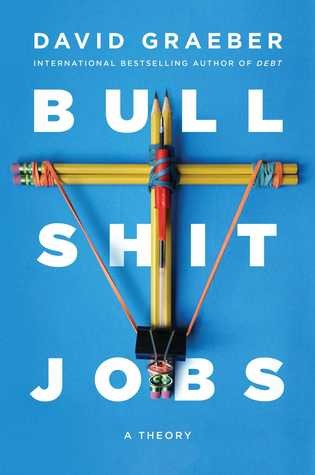fountainhead quoted Bullshit Jobs by David Graeber
In English, as currently spoken, we tend to make a distinction between "value" in the singular, as in the value of gold, pork bellies, antiques, and financial derivatives, and "values" in the plural: that is, family values, religious morality, political ideals, beauty, truth, integrity, and so on. Basically, we speak of "value" when talking about economic affairs, which usually comes down to all those human endeavors in which people are paid for their work or their actions are otherwise directed toward getting money. "Values" appear when that is notthe case.For instance, housework and child care are, surely, the single most common forms of unpaid work. Hence, we constantly hear about the importance of "family values." But participating in church activities, charitable works, political volunteering, and most artistic and scientific pursuits are equally unremunerated. Even if a sculptor does end up becoming fabulously wealthy and marries a porn star, or a guru ends up in possession of a fleet of Rolls-Royces, most will consider his wealth legitimate only insofar as it is a kind of side effect, because originally, at least, he wasn't in it just for the money. What money brings into the picture is the ability to make precise quantitative comparisons. Money makes it possible to say that this amount of pig iron is equivalent in value to that number of fruit drinks or pedicures or tickets to the Glastonbury music festival. This might sound obvious, but the implications are profound. It means the market value of a commodity is, precisely, the degree to which it can be compared to (and, hence, exchanged for) something else. This is exactly what is missing in the domain of "values"-it might sometimes be possible to argue that one work of art is more beautiful, or one religious devotee more pious than another, but it would be bizarre to ask how much more, to say that this monk is five times more pious than that one, or this Rembrandt is twice as lovely as that Monet.6 It would be if anything even more absurd to try to come up withamathematical formula to calculate just how much it would be legitimate to neglect one's family in pursuit of art, or break the law in the name of social justice. Obviously, people do make such decisions all the time, but by definition, they cannot be quantified. In fact, one could even further say that is precisely the key to their value. Just as commodities have economic "value" because they can be compared precisely with other commodities, "values" are valuable because they cannot be compared with anything. They are each considered unique, incommensurable-in a word, priceless. It seems to me that the words "value" and "values" have become our commonsense shorthand for how to think about such complicated questions. It's not a terrible one. Still, even this is more an ideal of how we like to think things should work than an accurate representation of how they actually do work. After all, it's not as if life is really divided between an "economy" where everyone thinks only about money and material self-interest, and a series of other spheres (politics, religion, family, and so on) where people behave entirely differently. Real motives are always mixed. It's always important to emphasize here that for most of human history, it would never have occurred to anyone that it would be possible to even make such distinctions; the very idea of either pure self-interest,or pure selfless altruism, would have seemed equally bizarre-just as bizarre, in fact, as the idea of "selling one's time." Such concepts became possible only with the rise of impersonal markets across Eurasia roughly around 600 BC. The invention of coinage made it possible to create markets where strangers could interact with one another only with an eye to material advantage; wherever these cash markets appeared, whether in China, India, or the Mediterranean world, they were quickly followed by the birth of universal religions that in every case preached that material things were not important, and that the pious should give their goods selflessly to charity. But no attempt to create an absolute firewall between material selfishness and selfless idealism (value and values) has ever been successful; […]
— Bullshit Jobs by David Graeber (61%)

